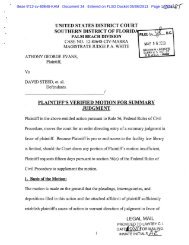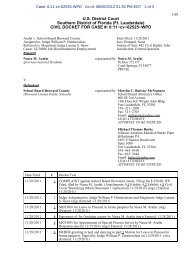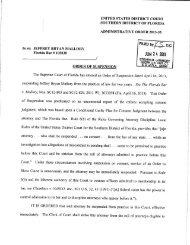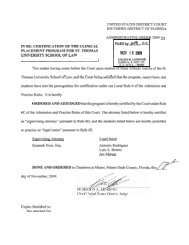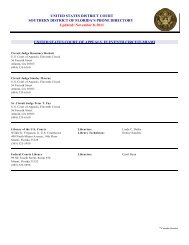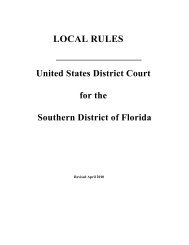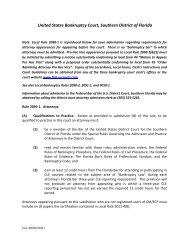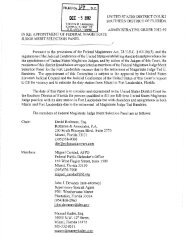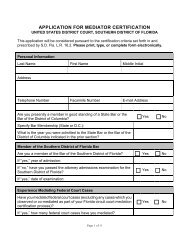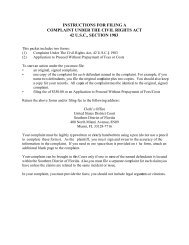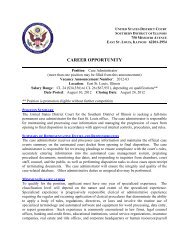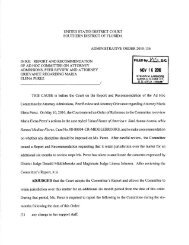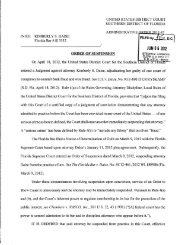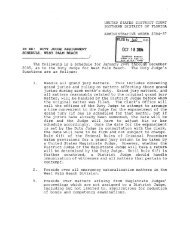JAN j 6 2010 - United States District Court
JAN j 6 2010 - United States District Court
JAN j 6 2010 - United States District Court
You also want an ePaper? Increase the reach of your titles
YUMPU automatically turns print PDFs into web optimized ePapers that Google loves.
answer. Interrogatories propounded in the form set forth in Appendix B to<br />
the Local Rules comply with the limitations of Federal Rules of Civil<br />
Procedure 26(b) and 33(a).<br />
(3) Responses. Federal Rule of Civil Procedure 33(a) requires the<br />
respondent to furnish whatever information is available, even if other<br />
requested information is lacking. When in doubt about the meaning of an<br />
interrogatory, the responding party should give it a reasonable<br />
interpretation (which may be specified in the response) and answer it so<br />
as to disclose rather than deny information. If an answer is made by<br />
reference to a document or electronically stored information, it should<br />
be attached or identified and made available for inspection. See Federal<br />
Rule of Civil Procedure 33(d).<br />
(4) Objections. Absent compelling circumstances, failure to assert<br />
objections to an interrogatory within the time period for answers<br />
constitutes a waiver and will preclude a party from asserting the<br />
objection in a response to a motion to compel. Objections should be<br />
specific, not generalized.<br />
(5) Objections Based on Privilege. Objections based on generalized<br />
claims of privilege will be rejected. A claim of privilege must be<br />
supported by a statement of particulars sufficient to enable the <strong>Court</strong> to<br />
assess its validity. For a more detailed discussion of the invocation of<br />
privilege, see the section of this handbook dealing with privilege.<br />
(6) Number of Interrogatories. Under Federal Rule of Civil Procedure<br />
33(a), without leave of <strong>Court</strong> or written stipulation of the parties,<br />
interrogatories are limited to twenty-five (25) in number including all<br />
discrete subparts.<br />
(7) Form Interrogatories. There are certain kinds of cases which lend<br />
themselves to interrogatories which may be markedly similar from case to<br />
case, such as employment discrimination and maritime cargo damage suits,<br />
for example, or diversity actions in which form interrogatories have been<br />
approved by state law. Except for the standard form interrogatories set<br />
forth in Appendix B to the Local Rules, interrogatories which parties<br />
seek to propound under Local Rules 26.1.C.3 (g) (3) and 26. l-rG^4(g) (4)<br />
should be carefully reviewed to make certain that they are tailored to<br />
the individual case.<br />
(8) Reference to Deposition, Document or Portion of Electronically Stored<br />
Information. Since a party is entitled to discovery both by deposition<br />
and interrogatories, it is ordinarily insufficient to answer an<br />
interrogatory by saying something such as "see deposition of Jane Smith,"<br />
or "see insurance claim." There are a number of reasons for this. For<br />
example, a corporation may be required to give its official corporate<br />
response even though one of its high-ranking officers has been deposed,<br />
since the testimony of an officer may not necessarily represent the full<br />
corporate answer. Similarly, a reference to a single document (or<br />
portion of electronically stored information) is not necessarily a full<br />
answer, and the information in the such material—unlike the interrogatory<br />
answer—is not ordinarily set forth under oath.<br />
97



